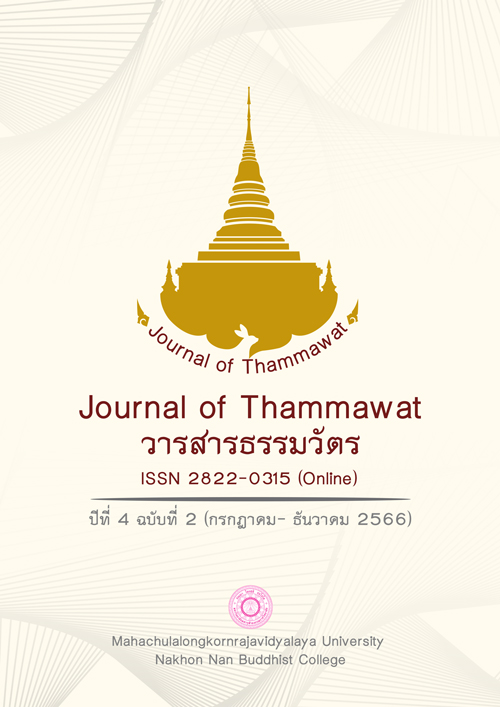3 Buddha Concepts of Comprehension, Awakening, Exaltation: Conceptual Innovation for Encouraged Sustainable Buddhist Agriculture
Main Article Content
Abstract
the study of Buddhist agriculture or agriculture on the path of buddhist. Its objective is to present a conceptual innovative with the conceptual set of 3 Buddha Concepts: Comprehension, Awakening, and Exaltation as a principle to promote Buddhist agriculture or agriculture on the path of Buddhist which is like an intellectual tool for creativity, is an abstract work that can be applied to agricultural practices in the buddhist way to be concrete and creative. It is a thought fertilizer with the principle of Comprehension, Awakening, and Exaltation. The study found that 1) Comprehension is the pursuit of knowledge, knowledgeable, and the transfer of knowledge. 2) Awakening is awakening from the old ideas, awakening from the same failure, and awakening from the closures of opportunities for progress. 3) Exaltation is particular the joyful behave of achievement as smiling, cheerful, happy, not anxious. The first and second are the cause of happiness and the last is the result of happiness. The three principles still have an effect to encourage on buddhist agriculture or agriculture on the path of buddhist, can be sustainable both in today and in the future.
Article Details

This work is licensed under a Creative Commons Attribution-NonCommercial-NoDerivatives 4.0 International License.
References
กระทรวงเกษตรกรและสหกรณ์. (2563). เกษตรกรไทยมีเท่าไรกัน. สืบค้นเมื่อ 21 เมษายน 2563, จาก https://marketeer online.co/archives/.
กระทรวงเกษตรและสหกรณ์กรมวิชาการเกษตร. (2536). เกษตรยั่งยืน อนาคตของการเกษตรไทย. กรุงเทพมหานคร: กรมวิชาการ เกษตรกระทรวงเกษตรและสหกรณ์.
ชูสินธุ์ ชนะสิทธิ์. (27 กุมภาพันธ์ 2555). บทสัมภาษณ์. หนังสือพิมพ์โพสต์ทูเดย์.
ธนสิทธิ์ คณฑา. (2558). การพัฒนาศูนย์การเรียนรู้เกษตรอินทรีย์วิถีพุทธบนพื้นฐานปรัชญาเศรษฐกิจพอเพียง. รายงานวิจัยคณะมนุษยศาสตร์และสังคมศาสตร์. มหาวิทยาลัยราชภัฏนครสวรรค์.
พระเทพรัตนมุนี. (2532). การเกษตรแนวพุทธเพื่อแก้ปัญหาเศรษฐกิจชุมชน. วารสารช่อพะยอม, 25(1) ): 53.
พระไพศาล วิสาโล. (2532). พุทธธรรมกับการพัฒนาสังคม. กรุงเทพมหานคร: เรือนแก้วการพิมพ์.
พระพรหมคุณาภรณ์ (ป.อ. ปยุตโต). (2559). เศรษฐศาสตร์แนวพุทธ (Buddhist Economics). พิมพ์ครั้งที่ 15, นครปฐม: วัดญาณเวศกวัน.
พระมหาวีระศักดิ์ อภินนฺทเวที (แสงพงษ์). (2561). การบูรณาการหลักพุทธธรรมกับเกษตรทฤษฎีใหม่ของศาสตร์พระราชา(วิทยานิพนธ์พุทธศาสตรดุษฎีบัณฑิต). มหาวิทยาลัยมหาจุฬาลงกรณราชวิทยาลัย.
มนูญ มุกข์ประดิษฐ์. (2547). มัชฌิมาปฏิปทาในพระไตรปิฎกทางสายกลางในแนวคิดเศรษฐกิจพอเพียงอันเนื่องมาจากพระราชดำริ(วิทยานิพนธ์พุทธศาสตรดุษฎีบัณฑิต). มหาวิทยาลัยมหาจุฬาลงกรณราชวิทยาลัย.
มหาจุฬาลงกรณราชวิทยาลัย. (2539). พระไตรปิฎกภาษาไทย ฉบับมหาจุฬาลงกรณราชวิทยาลัย. กรุงเทพมหานคร: โรงพิมพ์มหาจุฬาลงกรณราชวิทยาลัย.
มหาจุฬาลงกรณราชวิทยาลัย. (2532 – 2534). อรรถกถาภาษาไทย ฉบับมหาจุฬาลงกรณราชวิทยาลัย. กรุงเทพมหานคร: โรงพิมพ์มหาจุฬาลงกรณราชวิทยาลัย. โรงพิมพ์วิญญาณ.
วิฑูรย์ เลี่ยนจำรูญ. (2551). เส้นทางเกษตรกรรมยั่งยืน. กรุงเทพมหานคร: มูลนิธิชีววิถี.
สำนักงานคณะกรรมการพัฒนาการเศรษฐกิจและสังคมแห่งชาติ. (2561). แผนฯ 12 ฉบับประชาชน นวัตกรรมคือหัวใจของการพัฒนา. กรุงเทพมหานคร: ม.ป.พ.
สิรินทิพ. (2563). สวนเกษตรวิถีพุทธ. สืบค้นเมื่อ 22 กรกฎาคม 2563, จาก https://www.thaihealth.or.th/ Content/19175-.html.
หทัยรัตน์ ชาญวิการณ์. (2558). การพึ่งตนเองในรูปแบบพุทธเกษตรกรรมของชุมชนศาลีอโศก อำเภอไพศาลี จังหวัดนครสวรรค์(สารนิพนธ์มหาบัณฑิต). มหาวิทยาลัยธรรมศาสตร์.


